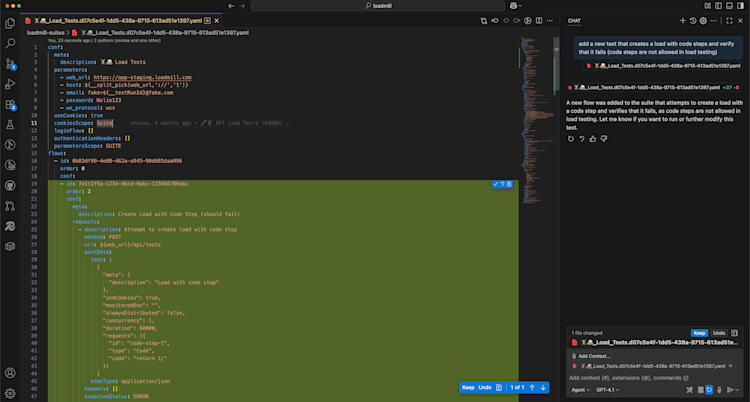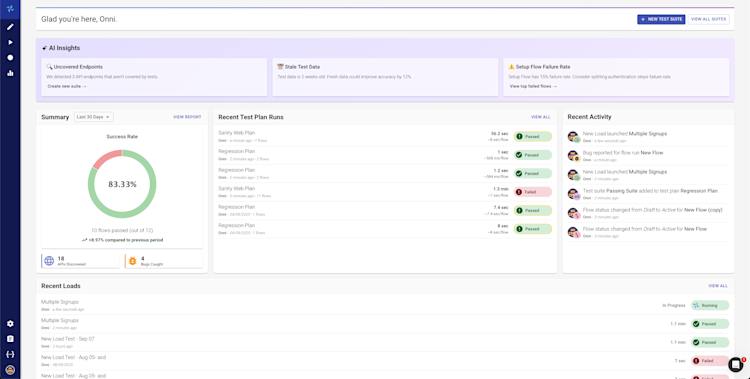Introduction
Software testing is undergoing a major shift. Across industries, speed is now the focus. Teams want faster releases, shorter feedback loops, and automation that scales without adding bottlenecks. The reality is that suites grow large and slow, maintenance consumes time, and the value per run drops.
What we see across enterprise teams today:
Code is written faster than ever. AI accelerates development, and QA needs to keep pace.
Test Maintenance is the bottleneck. More unsupervised, AI-generated code can introduce more defects.
UI testing is essential. It protects Frontend behavior and experience, yet at scale, it is hard to sustain and can be slow for logic better validated through APIs.
Assertions are a hidden bottleneck. Manual checks miss business outcomes and add maintenance as schemas change.
Scaling makes it harder. Simply adding more tests grows the bottleneck without improving the signal.
The future is shifting. Agent-driven workflows make continuous UI interaction less central, while validating business logic becomes essential.
Loadmill was built AI-native to address these pressures. Capabilities from test creation to maintenance, execution, and reporting are designed with AI at the core. This roadmap reflects what we have learned from our customer base and focuses on three areas that help teams move faster with higher confidence: AI Enhancements, Playwright Integration in Loadmill, and Contract Testing.
1) AI Enhancements
Objective: Deliver proactive intelligence that speeds up test creation, maintenance, and debugging.
Key capabilities
Explain Failure Makeover: Automatic explanations appear at the top of every report, turning analysis time into action time.
AI Refactor UI: An always visible Copilot-style box for instant edits and refactors during test maintenance.
Step Execution Agent: Embedded intelligence at each step for assertions, data extraction, and fixes, without learning query languages.
Auto-Generated Assertions: Automatic validations derived from step intent and business-process outcomes to raise signal per run and cut boilerplate.
Flow Pilot: AI copilot for authoring that turns intent into production-ready API tests.
Loadmill MCP Integration: Use Loadmill’s MCP server to select and run relevant tests. Enables AI agents to interact with Loadmill directly and unlock new agentic workflows.
![mcp_server]()
AI Insights Dashboard: A redesigned dashboard that highlights success rates, trends, and AI-generated insights leaders can trust.
![Dashboard_AI]()
Why we built Automatic Assertions
Manual checks left silent gaps in business outcomes like side effects, permissions, and data integrity.
Handwritten assertions became fragile as schemas and versions changed, adding maintenance and occasional false confidence.
Non-experts needed to contribute faster without deep query language knowledge.
Leaders wanted a higher signal per run tied to critical business processes.
Roadmap
Now: Explain Failure Makeover, Auto-Generated Assertions, and Flow Pilot.
Next: AI Refactor UI, Step Execution Agent, AI Insights Dashboard improvements.
Later: Cross-scenario intelligence that recommends missing validations across related business processes.
Impact: Faster creation and refactoring, lower maintenance, clearer debugging signals for both QA and developers.
2) Playwright Integration
Objective: Support UI testing as a first-class capability while shifting appropriate logic and data handling to faster API tests for speed and stability.
Key capabilities
Run Playwright in Loadmill: Execute existing Playwright suites with no setup and manage them in one platform.
Hybrid UI and API flows: Keep Frontend and browser validation in Playwright. Move supporting logic and edge cases to stable API steps where they fit best.
Shared sessions: Cookies and tokens flow between UI and API steps to reduce fragile setup.
Unified reporting: HTML output, screenshots, and video playback alongside API logs in one place.
AI-assisted optimization: Identify flaky or slow UI scenarios and recommend where API validation can shoulder the heavy lifting while preserving UI assertions that matter.
PR-aware execution: Run only what changed to speed up CI.
Click to record UI steps (preview): Rapid authoring for essential UI testing.
One-pass hybrid capture (preview): Record UI and API together to build resilient business-process tests in a single pass.
Roadmap
Now: Run Playwright in Loadmill, shared sessions, unified reporting.
Next: AI-driven refactoring, PR-aware execution, wider preview for click to record UI steps.
Later: General availability for one-pass hybrid capture and deeper Playwright analytics.
Impact: Modernize UI-heavy portfolios into faster, more reliable automation without discarding Playwright investments.
3) Contract Testing
Objective: Shift-left validation of API contracts across microservices to reduce effort for QA and Dev teams and catch breaking changes earlier.
Key capabilities
Consumer Driven Contracts: Define and enforce expectations between services, with AI-generated tests for compatibility.
Self-Healing Contract validation: Triage and heal test flows when contract-breaking changes are introduced.
Version-aware validation: Manage multiple contract versions for safer rollouts.
CI and CD enforcement: Validate contracts in the pipeline and block regressions early.
AI-generated test contracts: Build and maintain contracts from API traffic or OpenAPI specs that evolve with the system.
Roadmap
Now: Core CDC modeling and version-aware validation in active development.
Next: CI and CD enforcement with policy controls, first customers in private preview.
Later: Broad support for multi-tenant and multi-region topologies with automated drift detection.
Impact: Fewer integration surprises, faster independent releases, higher confidence across service teams.
Closing
Loadmill’s roadmap is focused and practical. AI Enhancements will raise speed, usability, and intelligence across testing. Playwright Integration in Loadmill will modernize UI testing portfolios without waste. Contract Testing will protect the backbone of API first enterprises by preventing breaking changes early. Together, these pillars shorten release cycles, reduce failures, and give teams a confident path to scale.



